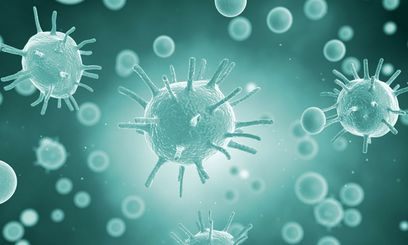(单词翻译:单击)
听力文本
This is Scientific American — 60-Second Science. I'm Steve Mirsky.
"As you know, asthma is a very prevalent disease in our society now. It wasn't so 50 years ago. And we now realize that the very early life microbes seem to have set you up or not for asthma."
Microbiologist Brett Finlay, from the University of British Columbia. In a study of Canadian infants, his team found "at three months of age, which is a really tiny little kid, there are four microbes, if you had these four microbes you had very very low risk of getting asthma, if you didn't have these microbes you were at very very high risk of asthma."
Finlay spoke February 17th at the annual meeting of the American Association for the Advancement of Science in Boston. Where he also discussed a recent follow up study among kids in rural Ecuador.
"And a big risk factor associated with asthma whether they had potable, clean water. So ironically the kids that got the clean water had higher asthma rates than the kids that had the dirty water. Now that makes sense in terms of microbial acquisition...it makes sense but I must admit I was surprised to see that, you'd think if we clean the water up that's good for the world...this is all part of the big 'hygiene hypothesis'...I say we're suffering from a hygiene hangover, we have cleaned our world up too much, and we're just not getting the microbes that our grandparents got. And as a result that's affecting many, many of the diseases that we experience in our society that we didn't experience a hundred years ago..."

"And one of the things that I'm starting to realize is that maybe these microbes are actually endangered species and you think about your great grandkids, they're gonna have very different microbes than you do and as we urbanize more and more our microbes become less diverse. And anyone that knows ecosystems, that's not good, you want large diversity in rainforests, same as your microbes. So there are people that are bio-banking things, I'm not suggesting that maybe you should biobank your poop now and give it to your great grandkids, I don't know. But...I worry we've gotten too clean and we have to ease off a bit...because we've taken a piece of our evolution right out of our bodies. We've evolved with these microbes all along, and they're just not there anymore and I think we're starting to see the effects in these diseases."
Thanks for listening for Scientific American — 60-Second Science Science. I'm Steve Mirsky.
参考译文
这里是科学美国人——60秒科学。我是史蒂夫·米尔斯基。
“如你们所知,哮喘是现在非常普遍的疾病。但在50年前却并不是这样。现在我们了解到,早期微生物似乎不会让我们得哮喘。”
布雷特·芬利是英属哥伦比亚大学的微生物学家。在对加拿大婴儿进行的一项研究中,他的团队发现“在婴儿仅3个月大时,体内有4种微生物,如果体内存在这4种微生物,那患哮喘病的几率就非常低;如果没有这些微生物,那患哮喘的几率就会非常高。”
2月17日,芬利在波士顿举行的美国促进协会年会上发表讲话。他同时谈论了一项针对厄瓜多尔乡村儿童进行的跟踪调查。
“与哮喘相关的一个重大风险因素是,这些孩子是否有可饮用的清洁水源。但是,讽刺的是,饮用洁净水的孩子患哮喘的几率要比饮用脏水的孩子高。现在看来,这种情况从微生物获得上可以说得通,虽然这可以说通,但是我必须承认,我对这种情况感到非常震惊,你们可能认为将水净化有益于世界,这是‘卫生假说'的部分内容。我认为我们正在遭受卫生的残留影响,我们将世界清洁得过于干净了,以致我们无法获得我们的祖辈曾获得的微生物。结果,现在我们染上了许多在100年前并没有的疾病。”
“我开始意识到的一件事是,这些微生物可能是濒临灭绝的物种,想想你们的子孙,他们体内的微生物可能和我们的完全不同,随着城市化的推进,我们体内微生物的多样性将越来越少。知道生态系统的人,都明白这是不利情况,我们希望热带雨林拥有多样性,同样,体内的微生物也应该具有多样性。有人在进行生物样本库交钥匙工程建设,我并不是建议你们把粪便做成生物样本,然后传给后代,我并不这么想。但是,我担心的是,我们过于干净了,我们要缓解一下,因为我们去掉了我们身体的部分进化结果。我们一直都在和这些微生物一起进化。可是现在它们已经不在我们体内了,我认为我们马上会看到这些疾病所带来的影响。”
谢谢大家收听科学美国人——60秒科学。我是史蒂夫·米尔斯基。
译文为可可英语翻译,未经授权请勿转载!
重点讲解
重点讲解:
1. make sense 可以理解;讲得通;
例句:What he said just doesn't make sense.
他讲的那番话简直不知所云。
2. suffer from (因疾病或处于其他不利境地而)受苦,受难,受折磨;
例句:She suffered from digestive trouble.
她患有消化系统疾病。
3. ease off (在程度、速度、强度等上)缓和,减轻,减弱;
例句:These days, the pressure has eased off.
最近,压力已经减轻。
4. all along 一直;
例句:I think she had been planning all along to leave Hungary.
我想她一直在计划离开匈牙利。


